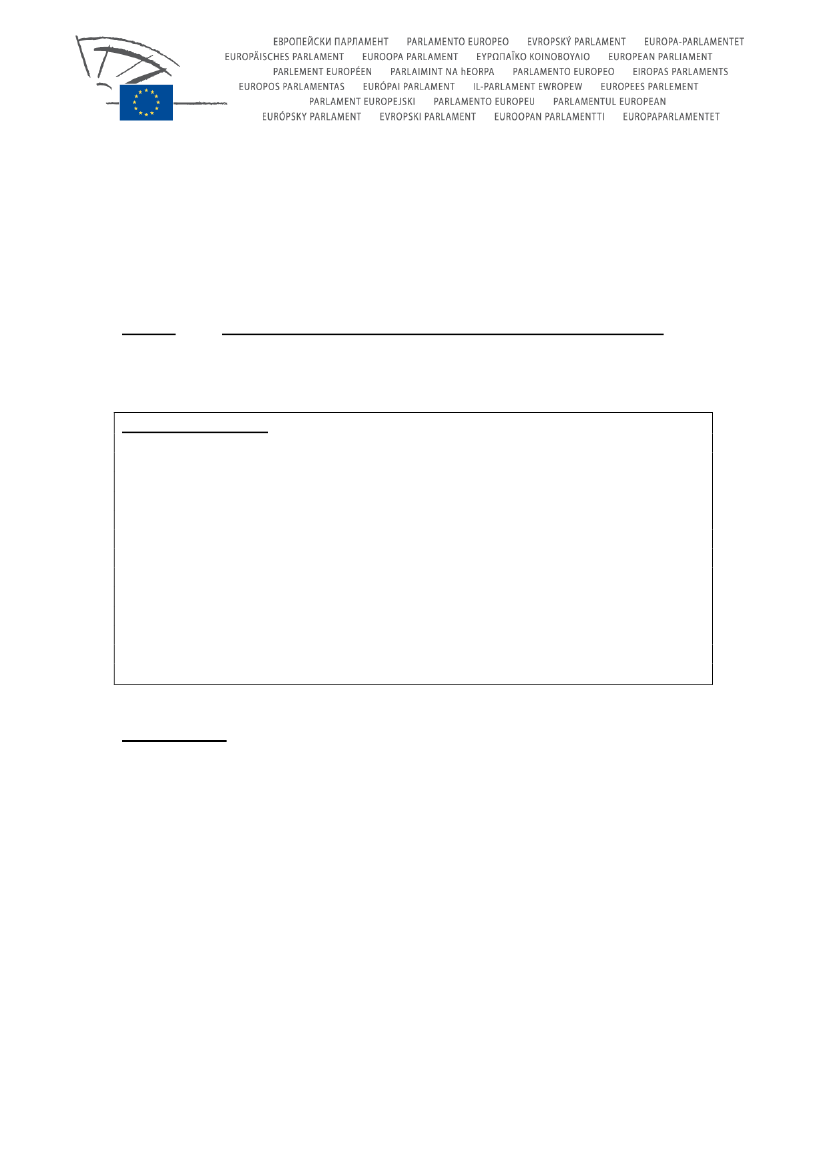Finansudvalget 2011-12
FIU Alm.del Bilag 236
Offentligt
Directorate-General for the PresidencyDirectorate for Relations with National ParliamentsLegislative Dialogue Unit
Brussels, 4th September 2012
Subject:
Interparliamentary dimension of the 2013 European SemesterSurvey among national Parliaments' participants of theinterparliamentary committee meeting of 27-28 February 2012
Results in a nutshell:26 Members from 23 Parliamentary Chambers in 19 EU member states completedthe "European semester" questionnaire. The questionnaire was divided into twomain sections: Part I) feedback on the 2012 interparliamentary committee meetingand Part II) feedback on the interparliamentary dimension for the next Europeansemester.The feedback on the interparliamentary committee meeting organised by the EP inFebruary 2012 is very positive. All respondents from national Parliaments would beinterested in further meetings of this kind, and almost all of them would beinterested in attending a "Parliamentary European week" and a second meetingafter the Spring European Council. No clear trend emerged as to the preferredtiming of the second meeting.
1. BackgroundOn 27 and 28 February 2012, the European Parliament's Economic and MonetaryAffairs Committee (ECON), in cooperation with the Committee on Budgets (BUDG)and the Employment and Social Affairs Committee (EMPL) organised aninterparliamentary committee meeting on the European semester for economic policycoordination.The meeting brought together 68 national Parliamentarians from 24 EU Member Statesto discuss economic governance issues with European Parliament President Mr MartinSchulz, MEPs, the President of the European Council Mr Herman Van Rompuy, thePresident of the European Commission Mr José Manuel Barroso and many othersenior EU policymakers. It was the biggest interparliamentary committee meeting inthe European Parliament so far.This initiative launched by the ECON, BUDG and EMPL committees, linked to theneed of stressing the democratic legitimacy of the European Semester, was also theresult of the EP resolution based on the Berès report adopted on 1 December 2011(2011/2071(INI)).[email protected]-www.europarl.europa.eu/webnpMichael AlfonsB-1047 Brussels - Tel +32 2 28 31052
In this context, and in view of preparing the interparliamentary dimension of the nextEuropean Semester, it was deemed useful to seek feedback on the 2012 meeting.A questionnaire was prepared at the request of Mrs Bowles, Mrs Berès and MrLamassoure, respectively Chairpersons of the ECON, BUDG and EMPL committees.Together with an accompanying letter by the three committee Chairpersons, it was sentto the representatives of national Parliaments on 1 June 2012 in order to be submittedto the Members of national Parliaments who had attended the interparliamentarycommittee meeting on the European semester in February.By 4 July 2012 the EP had received 26 replies from Members of the following 23Parliamentary Chambers: The Belgian Chamber and Senate, the Bulgarian NationalAssembly, the Czech Senate, the Danish Folketing, the German Bundestag, theEstonian Riigikogu, the Irish Dáil, the Spanish Senado, the French Senate, the ItalianChamber of Deputies and Senate, the Latvian Saeima, the Lithuanian Seimas, theHungarian National Assembly, the Maltese House of Representatives, the Polish Sejmand Senate, the Portuguese Assembleia da República, the Slovenian NationalAssembly, the Slovak National Council, the UK House of Commons and the House ofLords. The Luxembourg Chamber of Deputies did not submit a questionnaire, butanswered important questions in writing. The Hellenic Parliament and the FrenchAssemblé nationale did not reply because of recent general elections.With more than half of the national Chambers responding, the results are ofsignificance, but must not be misread as the official position of all nationalParliaments. The detailed results are included in the annex.
2. Final results2.1 Format, debates and networking
The feedback on the interparliamentary meeting organised in February is very positive.All respondents agreed that the meeting was organised at the right time of theEuropean semester governance cycle. An overwhelming majority described the overallprogramme, choice of topics and speakers as "Excellent" or "Good". A large majorityalso rated the quality of the debate and the networking opportunities as "Excellent" or"Good", while a minority considered them "OK".The sessions on the Fiscal Treaty (12 votes), sustainable growth, job creation andsocial progress (11 votes) and on fiscal discipline (9 votes) were consideredparticularly interesting, either because of their "topicality", because of theirparticularly fruitful and lively debate, because they looked beyond fiscal discipline orbecause they gave a broad overview of topics and points of view. Overwhelmingmajorities of more than 85% also stated that the meeting addressed the most importantissues linked to the European semester, that Members of their national delegationcould take the floor upon their request and that the duration of the meeting was"absolutely right" or "appropriate".
[email protected]-www.europarl.europa.eu/webnpMichael AlfonsB-1047 Brussels - Tel +32 2 28 31052
2
Individual suggestionsConcerning theformat,individual suggestions made by the respondents include anadditional panel toevaluate the previous European semesterincluding lessonslearned and a workshop to debatepractical and procedural aspects of nationalparliaments' involvementin the European semester at national level (participant fromthe Czech Senate); todevelop "new organizational formats"(working groups,workshops, etc.) for joint activities (respondent from the Bulgarian NationalAssembly); todevelop "a true working method"with a more methodic approachwhere topics are dealt with one by one and all delegations can comment on each ofthem (Member of the French Senate); andrestricted meetingson more focused issues(a member of the Portuguese Assembleia da República).Regardinglogistics,one participant from the UK House of Lords commented that therules on requests for the floor variedbetween the first and second sessions and shouldbe harmonised; a Member of the Estonian Parliament said that discussions couldbecome more dynamic ifrequests for the floorcould be made electronically; therespondent from the Danish Parliament proposed to allowmore timefor debatebetween MPs and MEPs. A Member of the Czech Senate suggested that networkingopportunities could be strengthened byseating MEPs and MPs together during theofficial dinner.
2.2 Follow-up and future eventsMore than half of the respondents said that there was some kind of follow up on themeeting in their Parliament, mainly written reports, press releases and debriefings bythe participants in their respective committees, but also a hearing scheduled withBUDG Chairperson Lamassoure in the Portuguese Parliament.All respondents confirmed their Chambers' interest in further meetings of this kind.About three quarters of them would prefer "in-depth discussions of specific topics" to"broad strategic discussions linking several topics". Instead of a two-day meeting withbroad discussions, the respondent from the German Bundestag suggests a one-daymeeting with in-depth discussions on a specific topic. The respondent from the CzechSenate makes this dependent upon the duration of the meeting: If the meeting is spreadout over a week, both broad and in-depth discussions are possible; if the current lengthis maintained, the debate should focus on broad policy issues.All respondents apart from the Belgian Chamber and Senate would be interested inattending a "Parliamentary European Week" for the European semester, spread over acouple of days and bringing MEPs and MPs together to debate specific issues inseparate, subsequent sessions. The respondents from the Belgian Parliament questionwhether it is realistic to convene MPs to Brussels for one week. While expressinginterest in the event, the respondent from the German Bundestag also underlines thattime constraints will make it difficult for Bundestag Members to participate in ameeting spread over a couple of days.An overwhelming majority would also be interested in participating in a secondinterparliamentary meeting organised after the Spring European Council. Only therespondents from the Lithuanian Seimas and the National Council of Slovakia areexplicitly not interested. At the same time, no clear trend emerged as to the preferred[email protected]-www.europarl.europa.eu/webnpMichael AlfonsB-1047 Brussels - Tel +32 2 28 31052
3
timing of such a meeting. Only 14 out of the 26 respondents answered the question onthe preferred timing. Their proposals ranged from March to November, and from"shortly after the Spring European Council" to "before the publication of the AnnualGrowth Survey".The respondent from the Danish Parliament did not answer the questions on theParliamentary week and the second meeting, stating that participation would dependon the expected outcome of such a meeting. While not responding to the questionnaireas such, the Luxembourg Chamber of Deputies expressed its interest in attending anevent, spread over several days, preceding the Spring European Council meeting thatwould gather members of national Parliaments and the European Parliament to debatespecific issues related to the European Semester. The Luxembourg Chamber wouldalso be interested in the participation to an interparliamentary meeting, following theSpring European meeting, bringing together Chairs of committees responsible for theEuropean Semester within national parliaments and the European Parliament, todiscuss the Commission's proposed recommendations.Almost three quarters of the respondents would be interested in exploring additionalforms of networking among participants, with mailing lists, videoconferencing andinternet fora (for instance on the interparliamentary information exchange websiteIPEX) being cited most often.Individual suggestionsA Member of the Czech Senate suggested that the representatives ofnationalParliaments are consulted informallybefore the organisation of such meetings, whilethe respondent from the French Senate proposed that national Parliaments'FinanceCommittee Chairs meet regularlywith a precise agenda. The respondent from theGerman Bundestag suggested to involve representatives of the European Central Bankin the committee meeting, in addition to representatives from the European Counciland the Commission. Respondents from the UK House of Commons and House ofLords stated clearly that the future ICM on the European Semestershould notprejudge any discussions on Article 13 of the Fiscal Treaty- once the Treaty isratified, the format of interparliamentary scrutiny should be agreed in the appropriateforum, either the Speakers' Conference or COSAC. The respondent from the ItalianSenate stated that shortconclusions or press releasesshould be issued at the end ofthe meeting.3. Next stepsThe European semester increases the coordination of national budgetary proceduresand recognises that national budgets are of European importance. To enable thesmooth and efficient running of the semester, the EU institutions need to find newways of working together and adapt their internal and interinstitutional procedures tothe ambitious calendar. At the same time, the creation of "grey areas" where neithernational Parliaments nor the European Parliament can exercise the necessarydemocratic control over crucial decisions should be avoided Efficient and regularcooperation between the European Parliament and national Parliaments will beessential to work towards ensuring democratic accountability and reinforcedtransparency throughout the governance cycle of the European semester.
[email protected]-www.europarl.europa.eu/webnpMichael AlfonsB-1047 Brussels - Tel +32 2 28 31052
4
The European Parliament is currently reflecting on ways to adapt its internalprocedures to implement the European semester, of which interparliamentary contactsand activities are an integral part. The feedback provided by national Parliaments inthe framework of this survey is a highly valuable contribution and forms the basis forthe reflection process on future interparliamentary activities.
[email protected]-www.europarl.europa.eu/webnpMichael AlfonsB-1047 Brussels - Tel +32 2 28 31052
5
Annex: Detailed resultsNB: Due to the small number of meeting participants and respondents, percentagepoints can fluctuate significantly with each new reply. The percentages shouldtherefore be read as trend indicators, not as definitive figures."n=" stands for the total number of replies to that particular question, as not all of therespondents replied to all the questions.Q1. Do you think that the meeting was organised at the right time
during the European semester governance cycle?
n=25
Q2. How would you rate the meeting on the following points?
a) Overall programmeb) Choice of topicsc) Choice of speakersd) Quality of the debatee) Networking opportunitiesQ3. Was there a session that you found particularly interesting?
n=24
If yes, which one:a) First day, plenary session (Mon 27/02, 15h15-17h00)b) First day, session 1 "Fiscal discipline and sustainability of publicfinances" (Mon 27/02, 17h00-18h45)c) First day, session 2 "Beyond budgetary discipline: How to achievesustainable growth, job creation and social progress in adverseeconomic circumstances" (Mon 27/02, 17h00-18h45)d) Dinner (Mon 27/02, 19h00)e) Second day, plenary session "Treaty on Stability, Coordination andGovernance in the Economic and Monetary Union: What Next?" (Tue28/02, 09h00-11h00)f) Concluding plenary session ((Tue 28/02, 11h00-12h30)6
9
Q4. Did the meeting address the most important issues linked to
the European semester and economic governance in the EU?
n=23
Q5. On balance, were the Members of your national
Parliament/Parliamentary Chamber given the floor upon their
request?
n=24
Q6. How would you rate the overall duration of the meeting?
n=24
[email protected]-www.europarl.europa.eu/webnpMichael AlfonsB-1047 Brussels - Tel +32 2 28 31052
6
Q8. Was there any follow-up on the meeting in your
Parliament/Parliamentary Chamber (e.g., short debriefing by the
participating Members in their respective committees, mention of
it in the context of the parliamentary debate on your Member
State's budget, written report by the participating Members, press
release, etc.)
n=24
Q9. Do meetings of this kind contribute to the parliamentary
dimension of the European semester for economic policy
coordination?
n=25
Q10. Would your Parliament/Parliamentary Chamber be
interested in further meetings of this kind?
n=26
Q11. Would your Parliament/Parliamentary Chamber prefer that
future meetings focus on broad strategic discussions linking
several policy topics or rather on in-depth discussions of specific
topics?
Broad strategic discussions linking several policy topicsIn-depth discussions of specific topicsn=6
20
2623,08%
76,92%
Q12. One possible future scenario is the organisation, before the
Spring European Council meeting, of a "Parliamentary European
Week" for the European semester. Such an event would be spread
over a couple of days and would bring together Members of
national Parliaments and the European Parliament to debate
specific issues, in separate subsequent sessions, such as economic
governance, budgetary policy, sustainable growth, job creation
etc.. Would your Parliament/Parliamentary Chamber be
interested in attending such an event?
n=25
Q13. The EP adopted a resolution last December 2011 on the
European Semester suggesting that it "intends to organise, from
2013, following the Spring European Council each year, a second
interparliamentary meeting bringing together the Chairs of the
committees responsible for the European Semester within national
parliaments and the European Parliament (ECON, EMPL, BUDG,
ENVI, ITRE) to discuss the Commission's proposed
recommendations". Would your Parliament/Parliamentary
Chamber be interested to participate in such an
interparliamentary meeting on the European semester , organised
after the Spring European Council meeting ?
n=25
Follow-up question: If yes, when should the second meeting
take place, in view of the European semester governance cycle
and your national Parliamentary calendar?
Q14. Would your Parliament be interested in exploring additional
forms of networking among participants after such events, such as
mailing lists, videoconferences, etc.?
92,00%
8,00%
14 replies received, proposals range from March to November12 questionnaire respondents skipped this follow-up questionn=26
[email protected]-www.europarl.europa.eu/webnpMichael AlfonsB-1047 Brussels - Tel +32 2 28 31052
7







